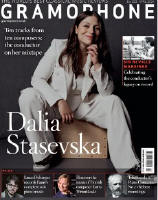Texte paru dans: / Appeared in: |
|
|
|
|
|
As Malcolm Bruno points out in his helpful booklet note, Mendelssohn did not provide ‘additional accompaniments’ as Mozart had done for Messiah. Sustained woodwind chords support the jagged strings in ‘Erbarm es Gott!’; minor alterations include the flutes and oboes in ‘So ist mein Jesus nun gefangen’ being shorn of their appoggiaturas. In fact, the only significant change is the rather charming substitution of gentle clarinets for the oboes d’amore and quacking oboes da caccia. But there are cuts aplenty: out went five chorales and six arias, including the tuneful ‘Ich will dir mein Herze schenken’ and the two with viola da gamba obbligato; and the lovely ‘Mache dich, mein Herze, rein’ lost its middle section and reprise. Surprisingly, Mendelssohn retained ‘Gebt mir meinen Jesum wieder’: also tuneful, but superfluous. Various cuts in the Evangelist’s part give a greater sense of drama to the narrative. When Mendelssohn alters the pitch his touch is less sure. The urgency of the phrase ‘Er soll vom fremden Raub bezahlen’ in the tenor’s ‘O Schmerz!’ is quite lost without the top B flat. And the alto aria ‘Erbarme dich’, oddly assigned to the soprano, has the solo violin disconcertingly shooting up an octave at one point.
There is nothing old-fashioned about the conducting of Christopher Jackson. With the chorale melody doubled an octave lower, the opening chorus flows along, taking 7'28" (compare Klemperer’s 11'47"!). The staccato exchanges between the two orchestras at ‘Seht – Wohin?’ are delicately pointed. The Bach Festival Orchestra (modern instruments, modern pitch) play very well throughout; the fortepiano continuo takes some getting used to, but Charlotte Mattax Moersch is sensitive and unobtrusive. The 90-odd singers of The Bach Choir of Bethlehem sing fervently. The big set pieces go well but the more intimate passages for the apostles are on the ponderous side. The sopranos have a tendency to flatness, such as in the opening number of Part 2.
The soloists are led by the exemplary Evangelist of Dann Coakwell, who tells the story with a free, easy delivery. There’s an appealing nobility to William Sharp as Jesus that can also be heard in the warm bass of Enrico Lagasca. Deprived of ‘Geduld, Geduld!’, Isaiah Bell is fluent in the melismas of ‘Ich will bei meinem Jesu wachen’. Clara Rottsolk sustains the line magically in ‘Aus Liebe will mein Heiland sterben’, and Luthien Brackett, deprived of ‘Erbarme dich’ as well as of ‘Sehet, Jesus hat die Hand’ and, indeed, the da capo of ‘Buss und Reu’, is touching in the bewilderment and sorrow of ‘Ach, nun ist mein Jesus hin’.
An enjoyable performance. In the end, though, what’s the point? Like Rimsky Korsakov’s version of Boris Godunov (on a much smaller scale, of course), Mendelssohn’s version of the St Matthew Passion was a pioneering effort, appropriate for its time and place. With the original freely available, this is really only of historical interest. |
|




